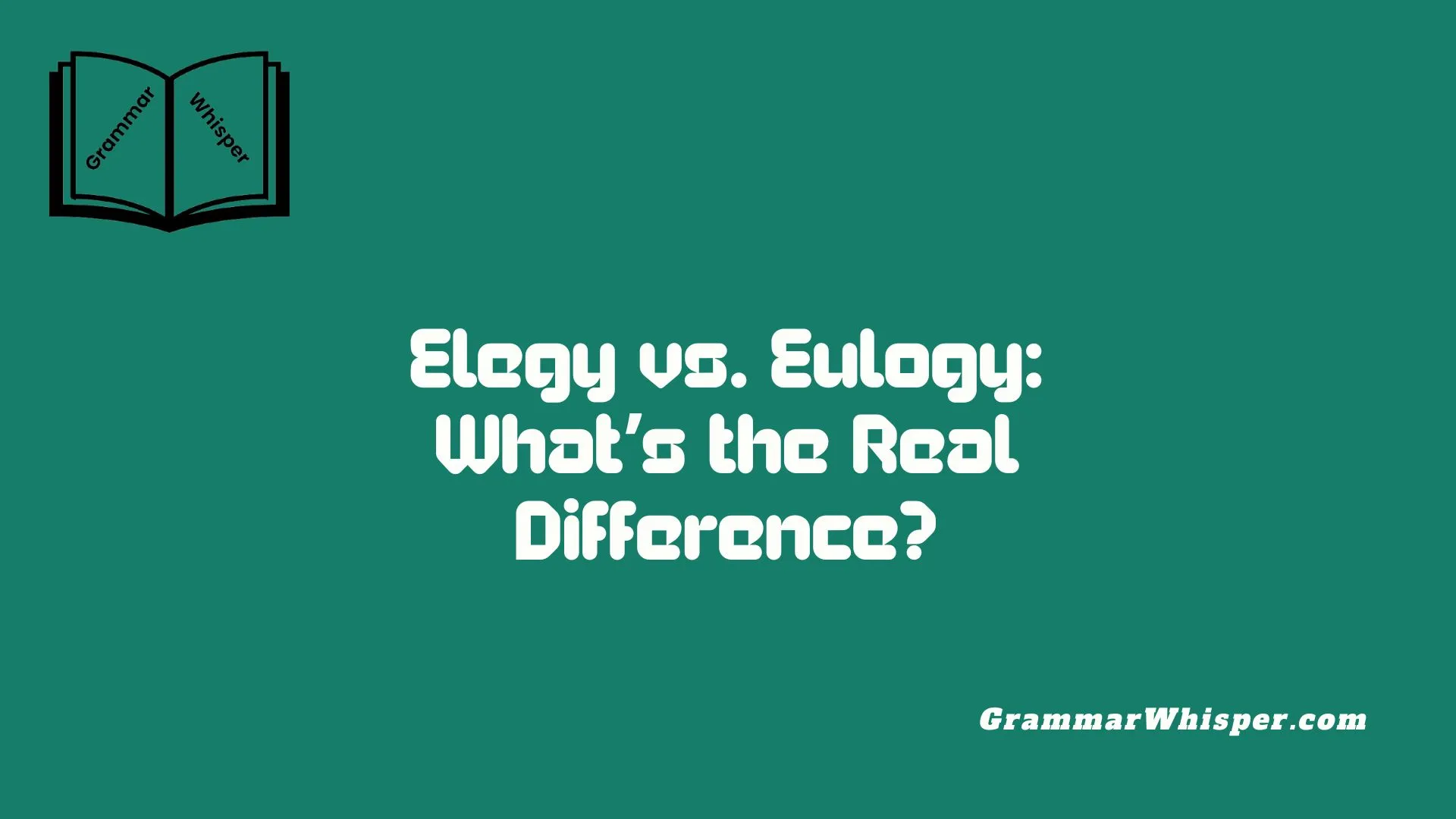In moments of personal loss, the words we speak truly matter. I’ve seen many confuse an Elegy vs. Eulogy, even though the terms may look similar. An elegy is a poetic expression of grief, while a eulogy is a spoken speech that offers remembrance. The purpose, usage, and meaning of these words are completely different. Choosing the right one avoids emotional misuse. Having written both for various occasions, I created this helpful guide so others could also understand the difference, and express their thoughts with respect and care.
These two forms also have strong historical roots and lasting literary value, holding real emotion in real-world applications. Whether you’re writing poetry, crafting a funeral note, or preparing a tribute speech, clarity in your message is essential. A strong elegy conveys quiet sorrow, while a eulogy celebrates life in voice. Grasping their significance helps you speak from the heart. From my experience, such thoughtful exploration not only grows your language skills but truly honors the remembered in the most meaningful way..
Understanding the Difference Between Elegy vs. Eulogy
The words elegy and eulogy both relate to death and remembrance, but serve very different functions.
- Elegy: A poem or literary work that reflects sorrow, usually mourning the dead.
Eulogy: A speech or written tribute delivered to honor someone who has passed away.
Let’s break this down into a simple comparison:
| Aspect | Elegy | Eulogy |
| Form | Poem, song, or literary text | Speech or written address |
| Purpose | Express grief artistically | Praise the life and deeds of the deceased |
| Audience | Readers (literature and poetry enthusiasts) | Listeners (funeral attendees, public gatherings) |
| Tone | Melancholy, reflective, sorrowful | Respectful, uplifting, commemorative |
| Common Settings | Literary collections, anthologies, poetry recitals | Funerals, memorial services, tribute ceremonies |
| Examples | “O Captain! My Captain!” by Walt Whitman | Oprah Winfrey’s eulogy for Maya Angelou |
Why the Elegy vs. Eulogy Distinction Matters
Using these words interchangeably can lead to misunderstanding or even embarrassment in sensitive situations such as funerals or memorial services. Knowing the difference is essential for:
- Public speakers preparing tributes.
- Writers and poets create literary works.
- Students learning literature or language arts.
- Anyone wanting to speak properly about mourning and remembrance.
The Historical Origins of Elegy and Eulogy
Understanding where these words came from can help solidify their meanings.
The Roots of “Elegy”
The term elegy traces back to ancient Greece.
- Derived from the Greek “elegeia”, referring to a type of poetic couplet often used for mournful or reflective themes.
- Later Latinized as “elegia”, adopted into English as “elegy”.
- Historically associated with poets like Theocritus and Callimachus, and later Roman and English poets.
The Roots of “Eulogy”
On the other hand, eulogy has entirely different origins:
- From the Greek “eulogia”, meaning “good words” or “praise”.
- Related to religious or ceremonial blessings.
- Entered English from medieval church Latin, used to refer to speeches that blessed or honored individuals.
Elegy in Literature: A Deep Dive into the Art of Mourning
What Makes a Work an Elegy?
An elegy is more than just a sad poem. It:
- It is written in poetic form.
- Expresses deep sorrow, loss, or longing.
- Often reflects on mortality, the passage of time, or personal loss.
Famous Elegies in History
- “Lycidas” by John Milton – Mourning the death of a fellow poet.
- “O Captain! My Captain!” by Walt Whitman – Grieving Abraham Lincoln.
- “Adonais” by Percy Bysshe Shelley – Tribute to fellow poet John Keats.
- “In Memoriam A.H.H.” by Alfred Lord Tennyson – A masterwork exploring personal loss.
Quote: “O Captain! My Captain! Our fearful trip is done…” – Walt Whitman
The Elegiac Tone Explained
The tone of an elegy is unmistakably somber:
- Melancholic – heavy with loss and grief.
- Reflective – pondering life, death, and the afterlife.
- Solemn – respectful in its mourning.
Where You’ll Find Elegies Today
- Poetry anthologies.
- Literary journals.
- Modern music and songwriting (e.g., “Elegy for the Arctic” by Ludovico Einaudi).
The Eulogy: A Living Tribute Through Speech
What is a Eulogy?
Unlike an elegy, a eulogy is spoken or written speech praising a deceased person’s life and character. It is:
- Delivered at funerals or memorials.
- Aimed at audiences gathered to honor the deceased.
- Often personal, warm, and uplifting despite the grief.
Famous Eulogies and What We Learn from Them
- Barack Obama’s Eulogy for John Lewis – A blend of personal reflection and national tribute.
- Ronald Reagan’s Eulogy for the Challenger Crew – Honoring astronauts with dignity and hope.
- Oprah Winfrey’s Tribute to Maya Angelou – A heartfelt speech that connected personal memories with Angelou’s literary legacy.
Structure of a Good Eulogy
- Introduction: Set the tone – respectful and personal.
- Life Story: Highlight milestones and achievements.
- Personal Touch: Share anecdotes or touching moments.
- Conclusion: Leave a message of hope, love, or inspiration.
Elegy vs. Eulogy in Practical Use
A common source of confusion comes from similar sounds and overlapping contexts. Let’s make the distinction unmistakably clear:
| Aspect | Elegy | Eulogy |
| What it is | A poem or literary work | A speech or tribute |
| Purpose | Express mourning artistically | Praise and celebrate the life of the deceased |
| When used | In literature, poetry,and music | During funerals, memorials, and retirement ceremonies |
| Examples | “Adonais” by Shelley; Whitman’s “O Captain!” | Oprah’s tribute to Maya Angelou; Obama for John Lewis |
Pronunciation and Usage Tips for Elegy vs. Eulogy
Correct pronunciation helps you sound confident and knowledgeable.
| Word | Pronunciation | Phonetic |
| Elegy | EL-uh-jee | /ˈɛlɪdʒi/ |
| Eulogy | YOO-luh-jee | /ˈjuːlədʒi/ |
Avoid These Common Mistakes:
- Mixing up eulogy with elegy in speeches.
- Using “elegy” to describe a funeral speech it’s incorrect.
- Spelling errors: “eulogy” not “eulegy” or “ulogy”.
Modern Relevance of Elegy vs. Eulogy
Despite their ancient origins, these words are far from outdated.
- Elegies are found in modern music, movies, and books.
- Example: Elegy for the Arctic – a musical piece by Ludovico Einaudi raising climate change awareness.
- Eulogies are broadcast globally during major public figures’ funerals.
- Example: The televised eulogy for Queen Elizabeth II in 2022.
Case Studies: Real Examples of Elegy vs. Eulogy
Case Study 1: Media Misuse
A news outlet wrongly labeled a funeral eulogy as an “elegy” during coverage of Nelson Mandela’s memorial – an embarrassing editorial slip showing why clarity matters.
Case Study 2: A Perfect Modern Elegy
The poem “Elegy for a Young Friend” by Anne Sexton displays the classic features of elegy – sorrow, poetic form, and reflection – without being spoken or delivered in a service.
Case Study 3: A Memorable Eulogy
Steve Jobs’ sister, Mona Simpson, delivered a moving eulogy at his memorial service, blending personal stories with philosophical reflections – the perfect example of a eulogy done right.
Conclusion
Both elegy and eulogy offer powerful means to cope with loss, but they do so differently.
- An elegy captures grief in the timeless beauty of verse.
- A eulogy shares memories and honors a life through heartfelt speech.
Understanding and using these words correctly shows respect, cultural literacy, and sensitivity in times of mourning.
Whether you are a writer, speaker, or simply someone seeking to communicate with care, let this guide to elegy vs. eulogy sharpen your understanding and expression.
References and Further Reading
- Elegies
- How to Write a Eulogy
FAQs
What is the main difference between an elegy and a eulogy?
An elegy is a poem or literary work that mourns the loss of someone or something, often reflecting sorrowfully on death or loss. A eulogy, on the other hand, is a spoken or written speech delivered at funerals or memorial services to honor and celebrate the life of the deceased.
Can a eulogy be written in the form of a poem?
Yes, a eulogy can be written as a poem, especially if the speaker is a poet or writer. However, even when poetic, its primary purpose remains to honor and praise the deceased, making it a eulogy, not an elegy. An elegy, by definition, is intended as a literary work rather than a spoken tribute.
Is an elegy always about death?
While elegies are most commonly associated with mourning the dead, some modern elegies focus on lost ideas, fading traditions, or the passing of time. However, the central theme of an elegy is almost always loss, absence, or lamentation.
Who usually delivers a eulogy?
A close family member, friend, religious leader, or colleague typically delivers a eulogy during a funeral or memorial service. In some cases, public figures or officials may offer eulogies for renowned personalities.
Why are the words elegy and eulogy often confused?
These two terms sound similar and are both related to death and remembrance, which causes frequent mix-ups. However, they serve entirely different purposes – one as a poem (elegy) and the other as a speech (eulogy). Remembering their format and function helps avoid this confusion.











